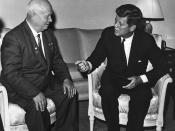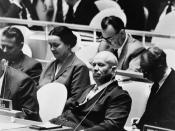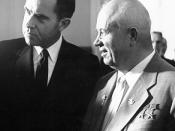After the Soviet Red Army repressed the Hungarian Revolution in 1956, Khrushchev made many attempts relating to what he earlier termed "peaceful coexistence". His efforts to ease tension between the USSR and US can be considered successful, for it was the first time a Soviet leader initiated cooperation, admitted past mistakes, and actively proposed cooperation between the two countries.
After the Second World War ended, relations between the two superpowers gradually deteriorated. Stalin was not one to negotiate and compromise; anything he wanted he took by force. Stalin's direct action was demonstrated in the Berlin Blockade from 1948-1949, where he closed all transport links into the city with no forewarning. After the Potsdam Conference in 1945, there were no summit meetings between the two superpowers. After Stalin's death in 1953, Nikita Khrushchev emerged as leader implemented a more passive foreign policy approach. Khrushchev tried to promote "peaceful coexistence". Political prisoners were set free, Tito, leader of Yugoslavia, was told that there were "different roads to communism", and foreign aid was given to non-communist countries.
These actions seemed to send a message to the West as wanting to cooperate and make a new start.
At the 20th annual Soviet Communist Party meeting, Khrushchev publicly talked about his policy of peaceful coexistence and cooperation, and introduced his policy of Destalinisation. He accused Stalin of being a murderer and tyrant. To the West, seeing that a former official under Stalin was undermining him in this way suggested that the two superpowers might be able to come to terms and possibly cooperate with each other in the future, for US foreign policy had viewed Stalin as aggressive and antagonistic.
In addition, Khrushchev made many active attempts to improve relations with the West. Even though the USSR was just one step behind the US in...


